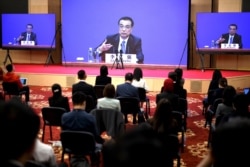China’s announcement this week to suspend debt repayments for 77 low-income countries as part of the G-20’s debt relief program gives Beijing a political boost with foreign allies at a time when China is under scrutiny for its role in the start of the coronavirus pandemic.
Exactly how much of a political boost remains unclear. When Chinese Vice Foreign Minister Ma Zhaoxu told reporters in Beijing on Monday that Beijing is implementing a moratorium on debt payments to 77 developing countries and regions, he did not offer details, including the beneficiaries, the amount of money involved or terms of the repayment suspension.
China is currently the largest single creditor in the world, with outstanding loans to other countries in excess of 6% of global GDP. A recent study published by the Harvard Business Review found that among the 50 developing countries with the highest levels of debt, about 15% of total obligations were owed to China.
The coronavirus pandemic has dealt a huge blow to the global economy, and China’s own finances have not been spared. In late May, at the country’s National People’s Congress, Chinese Premier Li Keqiang warned that governments at all levels must tighten budgets and the central government should take the lead.
China's official unemployment rate in April was 6%, slightly higher than that in March. However, economists estimate China's real unemployment rate to be 20.5% in April, with at least 70 million unemployed.
Li Keqiang said in response to a reporter's question at the two sessions on May 28 that the average annual income in China is around $4,250 (30,000 yuan) but 600 million people earn only $140 (1,000 yuan) a month. He also said that in a medium-sized city, it might be difficult to find rent on that salary.
Notably, officials appear so uncertain about the economy that for the first time since 1990, Beijing did not set a growth target for this year's economy.
While recent data suggest that China is emerging from an economic slowdown, the recovery won’t be easy. And on China’s tightly controlled internet, some users are questioning whether the government should prioritize other countries' interests over its own.
How long will repayments be suspended?
In the short term, creditors suspending debt repayments would help to avoid bad debts, according to Weiping Qin, an economist in the United States.
Qin told VOA : “On the debtor side, if their economies are in great trouble, if they have no way to repay the debts now, and if they do not reach an agreement with their creditors, it will easily cause bad debts to have a negative impact on both sides. Moreover, the deterioration will lead to a greater crisis. I believe that the creditors and debtors can reach an understanding and delay for, let’s say, about half a year, for both sides to find a practical solution, to at least temporarily avoid further deterioration of the situation."
Qin pointed out that debt repayment suspension can only be a short-term arrangement, with the purpose being to give debtor countries a period of time to get out of economic difficulties. If such short-term arrangements do not help the domestic economies of debtor countries improve, that could signal danger for Beijing’s balance sheets.
Specifically in China's case, he believes that the Chinese government is now in a very bad financial position because of its foreign lending. In the event of a debt default in which debtor countries are unable to meet the debt repayment, China would bear huge financial losses as well as pressure from its own public.
Analysts say the suspension of debt repayments is a needed move to avoid a pile of bad debt. In light of heightened tensions with the West, China must maintain its relations with countries in Africa and Latin America.
According to the Associated Press’s interview with Ghana’s finance minister in April, Africa’s debt to China is over $145 billion. About $8 billion in payments are required this year.
Dajun Zhong, an economic observer in Beijing, sees the payment suspension as China’s helpless option.
He told VOA: “[China] can’t get the debt payment, some countries are too poor to pay back, what can you do otherwise? The Chinese government is just giving it a name, but they are actually bad debts."
Zhong said he believes that the payment suspension is for diplomatic benefits. He said China will have to pay a heavy price if it wants to win as many political allies as possible internationally, even if they are the poor countries, while the heavy cost will eventually be passed on to the Chinese people.
Adrianna Zhang contributed to this report.







